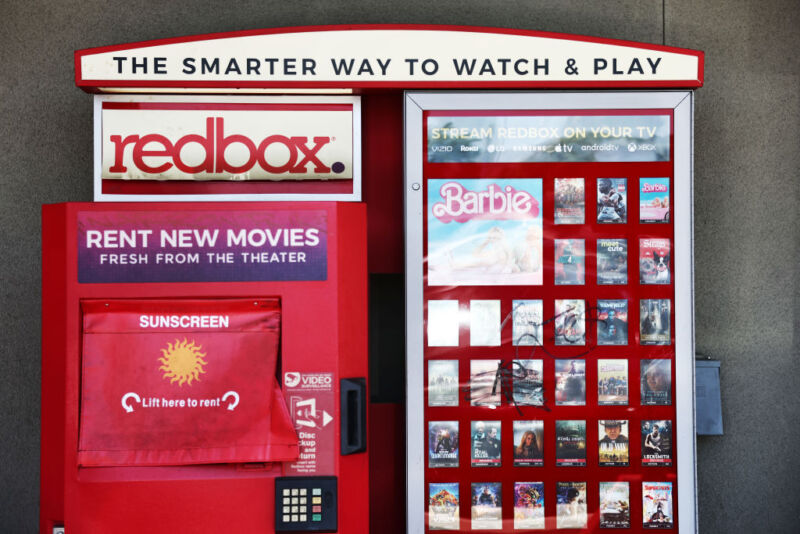
Since 2004, red DVD rental kiosks posted near entrances of grocery stores and the like tempted shoppers with movie (and until 2019, video game) disc rentals. But the last 24,000 of Redbox’s kiosks are going away, as Redbox’s parent company moved to chapter 7 liquidation bankruptcy this week. The end of Redbox marks another death knell for the DVD industry at a time when volatile streaming services are making physical media appealing again.
Redbox shutting down
Chicken Soup for the Soul Entertainment, which owns Redbox, filed for chapter 11 bankruptcy on June 29. But on Wednesday, Judge Thomas M. Horan of the US Bankruptcy Court for the District of Delaware approved a conversion to chapter 7, signaling the liquidation of business, per Deadline. Redbox’s remaining 24,000 kiosks will close, and 1,000 workers will be laid off (severance and back pay eligibility are under review, and a bankruptcy trustee will investigate if trust funds intended for employees were misappropriated).
Chicken Soup bought Redbox for $375 million in 2022 and is $970 million in debt. It will also be shuttering its Redbox, Crackle, and Popcornflix streaming services.
DVDs in decline
As a DVD-centric business, Redbox was living on borrowed time. The convenience of on-demand streaming made it hard to compete, and bankruptcy proceedings revealed that Redbox was paying employees more than it was earning.
Overall, the past year hasn’t been a good one for DVD or Blu-ray devotees, as many businesses announced that they’re exiting the industry. In August, Netflix quit its original business of mailing out rental DVDs. Now the king of streaming, the remaining DVD business was so menial that Netflix gave away DVDs as it shut down operations.
Once industry disruptors, DVDs and Blu-rays have been further ushered out the door in 2024. In April, Target confirmed that it will only sell DVDs in stores during “key times,” like the winter holiday season or the release of a newer movie to DVD. The news hit especially hard considering Best Buy ended DVD and Blu-ray sales in-store and online this year. Disney is outsourcing its DVD and Blu-ray business to Sony, and Sony this month revealed plans to stop selling recordable Blu-rays to consumers (it hasn’t decided when yet).
Bad timing
It’s sensible for businesses to shift from physical media sales. Per CNBC’s calculations, DVD sales fell over 86 percent between 2008 and 2019. Research from the Motion Picture Association in 2021 found that physical media represented 8 percent of the home/mobile entertainment market in the US, falling behind digital (80 percent) and theatrical (12 percent).
But as physical media gets less lucrative and the shuttering of businesses makes optical discs harder to find, the streaming services that largely replaced them are getting aggravating and unreliable. And with the streaming industry becoming more competitive and profit-hungry than ever, you never know if the movie/show that most attracted you to a streaming service will still be available when you finally get a chance to sit down and watch. Even paid-for online libraries that were marketed as available “forever” have been ripped away from customers.
When someone buys or rents a DVD, they know exactly what content they’re paying for and for how long they’ll have it (assuming they take care of the physical media). They can also watch the content if the Internet goes out and be certain that they’re getting uncompressed 4K resolution. DVD viewers are also less likely to be bombarded with ads whenever they pause and can get around an ad-riddled smart TV home screen (nothing’s perfect; some DVDs have unskippable commercials).
Streaming isn’t likely to stabilize any time soon, either. Team-ups between streaming providers and merger/acquisition activity make the future of streaming and the quality of available services uncertain. For example, what’s ahead for Paramount+ and Pluto now that Paramount is planning a Skydance merger?
There’s also something to be said about how limiting reliance on streaming can be for movie buffs and people with unique tastes. Treasured content, like older movies or canceled TV shows, isn’t always put on streaming services. And what is put on streaming is sometimes altered, including with new music and controversial scenes/episodes or embarrassing moments at live events removed.
A DVD company like Redbox closing was years in the making. There are people who believe it’s prudent to maintain a physical media library, but renting one is even more niche. Still, places that offer DVDs have gotten significantly rarer recently, and relying solely on an increasingly cable-like streaming industry for home entertainment is a scary proposition. Seeing an alternative option in the form of a red, slender box outside my grocery store actually sounds nice right now.





